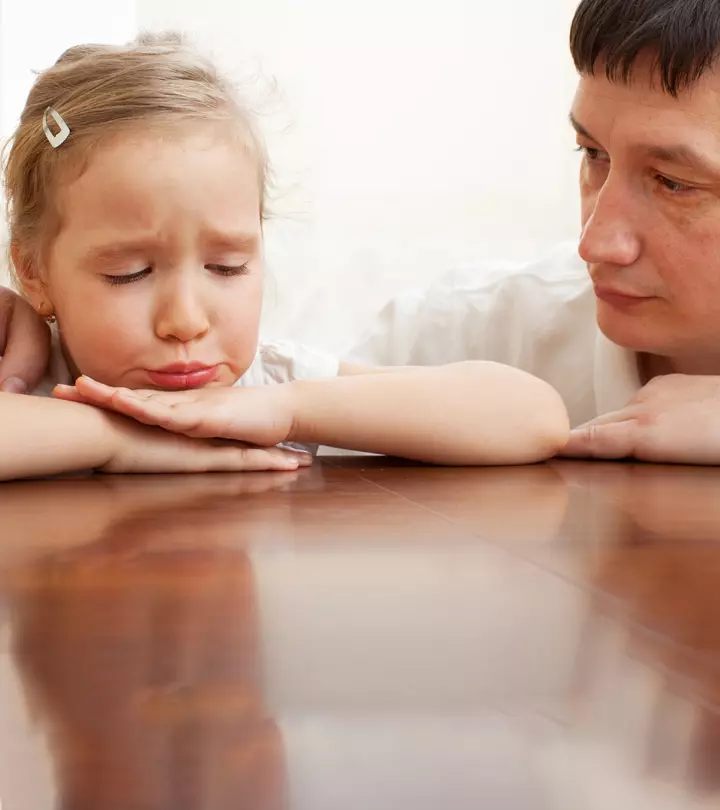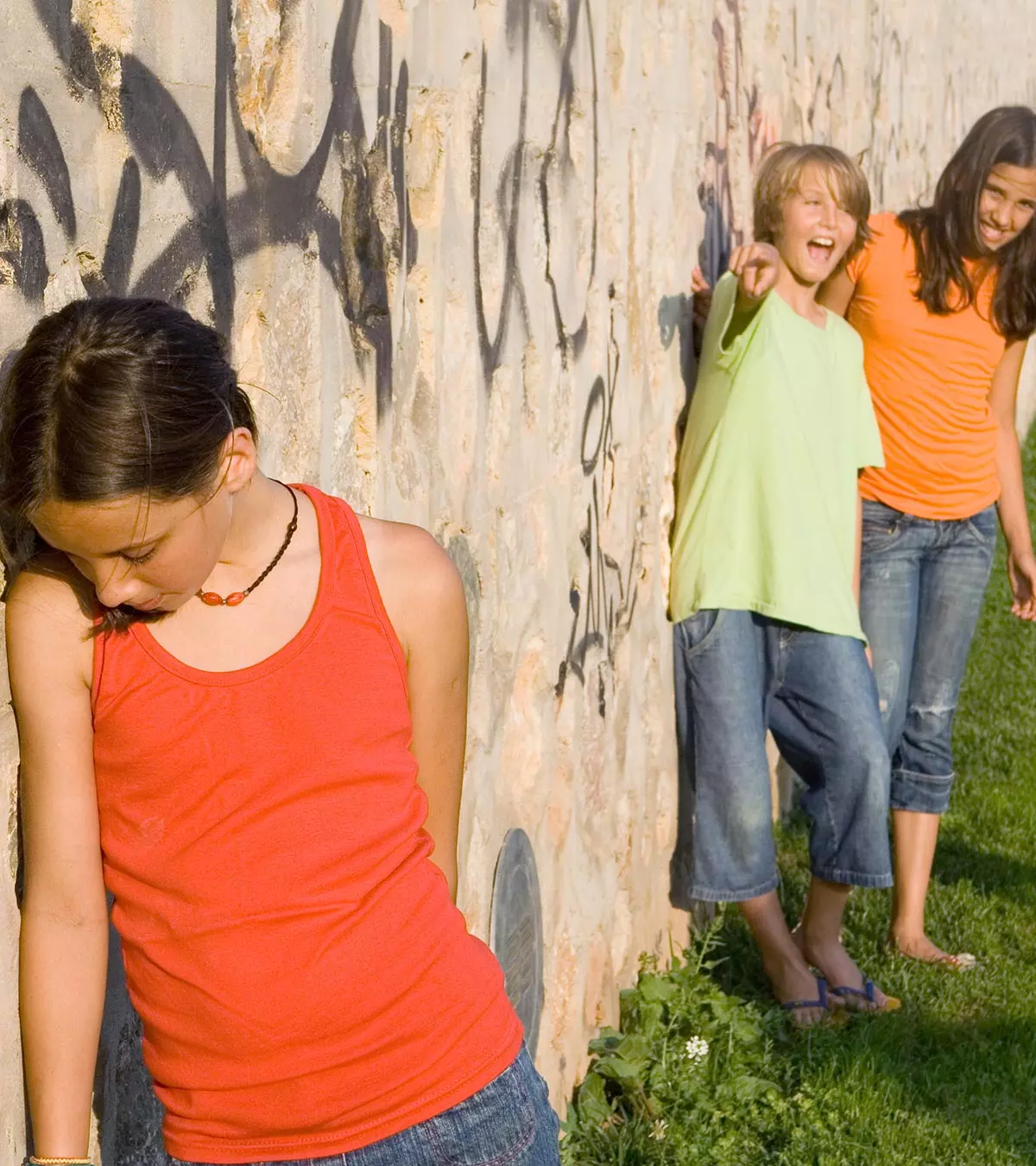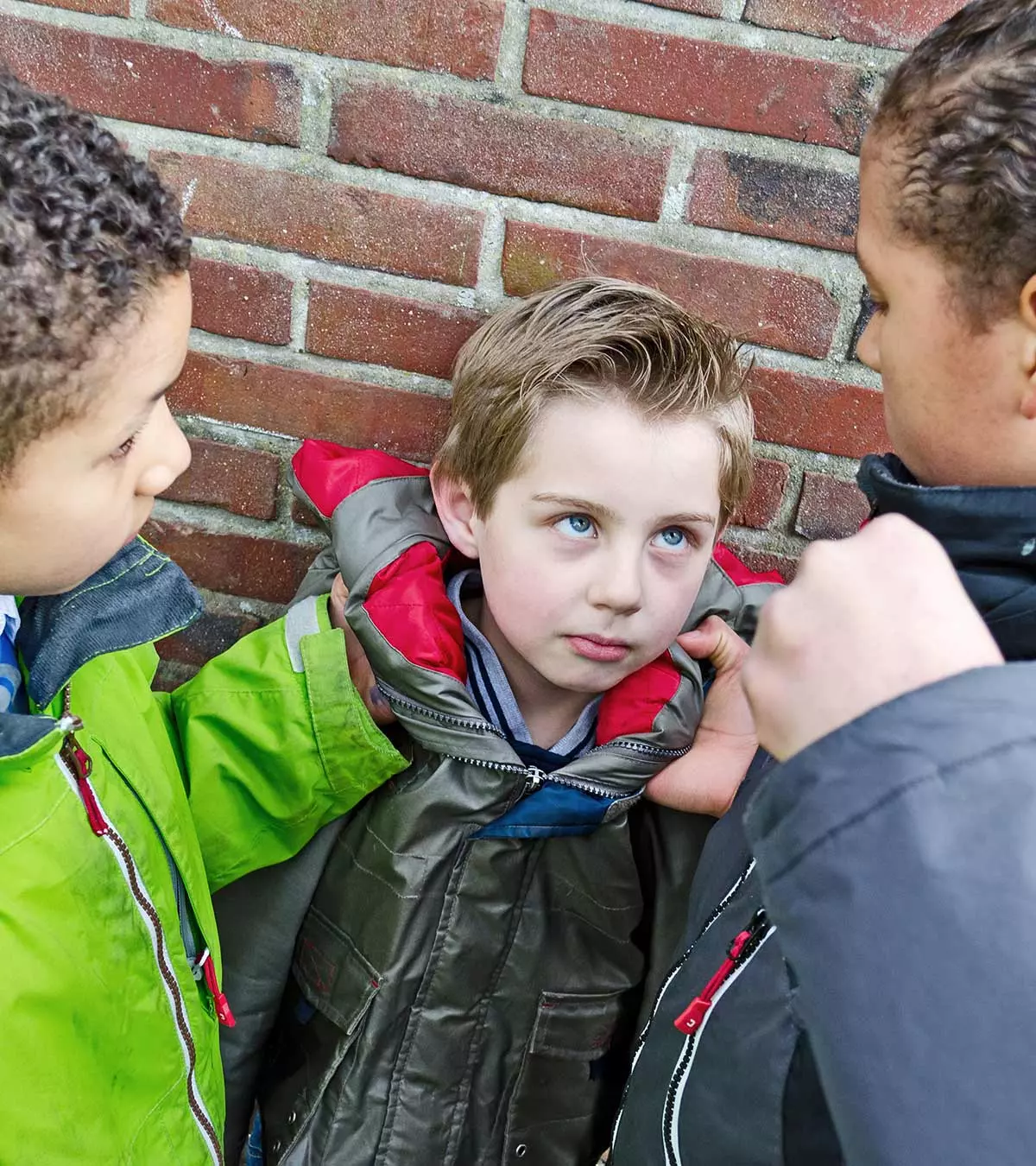
Image: Midjourney/ MomJunction Design Team
A bad habit is a repeated or habitual negative behavior that is socially unacceptable and inappropriate. Some bad habits in kids may be irritating, while others can be disappointing and frustrating. Whatever the case, outgrowing those habits is important to develop a socially acceptable demeanor. In most cases, children outgrow bad habits when they are older and better understand the consequences of their actions. However, a few bad habits may need monitoring as they may indicate an underlying problem, such as anxiety, insecurity, stress, or frustration (1). Hence, focus on the causes of bad habits rather than the habit itself to help your child outgrow them. Keep reading as we take you through some of the common bad habits a child may have and some effective tips to help your child overcome these habits.
Key Pointers
- Children’s bad habits such as thumb sucking and nose-picking can be corrected with easy tricks.
- They may sometimes grind their teeth out of stress. Try understanding the cause and calm them down or consult your child’s dentist.
- If they tend to mouth bad words, try not to react instantly and explain why they shouldn’t use them.
- Talking back, touching private parts, and more negative habits and tips to deal with are explained here.
15+ Bad Habits In Kids
1. Thumb-sucking

The habit of thumb-sucking starts soon after the baby is born and continues until the age of two to four years. While many babies stop sucking their fingers naturally by the age of two to three years, others might need intervention.
The main reason for thumb-sucking is the natural sucking reflexiA sudden and involuntary response to a stimulus in babies that makes them keep their thumb or fingers in the mouth. Initially, sucking their thumb makes them feel secure, and later, it becomes a habit in some children. They try to do it whenever they need soothing or while going to sleep.
Although thumb sucking might not be a concern until you see the child’s permanent teeth forming, if the child continues the habit, it might affect the teeth line up and lead to other dental problems (2). Unhealthy practices like thumb sucking should be discouraged before they can cause lasting damage.
How to correct thumb-sucking?
- If your child is of understandable age, try to explain why the habit is bad and offer them rewards whenever they stop doing it.
- If the habit is a reaction to some kind of stress, try to identify it and offer comfort to the child in other ways.
- If your child is doing it unconsciously, gently remind them and ask them to stop the habit.
 Research finds
Research finds2. Nail-biting
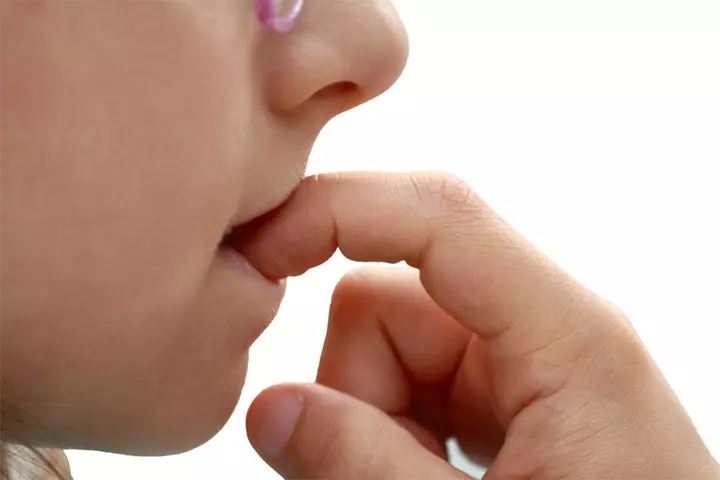
Not just children, but also adults have a habit of biting their nails when they’re stressed. If the childhood habit of nail-biting isn’t corrected at the right time, it would continue until adulthood and become a persistent habit.
According to the US-based Nemours Foundation, an estimated 30–60% of children and teens bite one or more fingernails (1).
Even though the actual reason or cause for nail-biting is unknown, many believe that it results from stress and anxiety.
How to prevent nail-biting?
- If you agree that your child is biting nails due to stress or some tension, try to address the cause.
- If it’s not due to stress, try to keep the child’s hands busy. Apply some nail polish or engage them in some handcrafts, such as playdough and papercrafts.
- For older children, try to explain why they should not bite their nails, and ask them to try to stop it.
- When they’re trying to stop the habit, praise them and try to reward them.
3. Lip-biting/sucking/licking

If you frequently find your child’s lower lip chapped or dry, it could be due to the lip-sucking habit (3).
The main reasons for the habit are dry lips, anxiety, or misalignmentiThe incorrect arrangement or placement of something of teeth. When the lips are dry, children tend to lick or suck the lips to moisten them.
Also, when they’re new to any environment or feel stressed, they tend to suck or lick their lips unconsciously.
In some cases, if the upper teeth protrude over the lower teeth, it might result in lip biting or sucking. This is a dental problem and hence take it up with a dentist.
Persistent lip-sucking or biting might result in red, swollen, and irritated lips and skin around the mouth. It might also cause pain and discomfort and lead to lip tissue damage in some cases.
How to prevent lip-sucking?
- For older children, apply lip balm or petroleum jelly to treat dry and chapped lips.
- If they’re under stress and biting their lips, try to comfort them and divert their attention.
- Encourage them to drink more water to prevent dry lips.
- Give them sugar-free candies to distract them from the lip-sucking habit.
4. Nose-picking
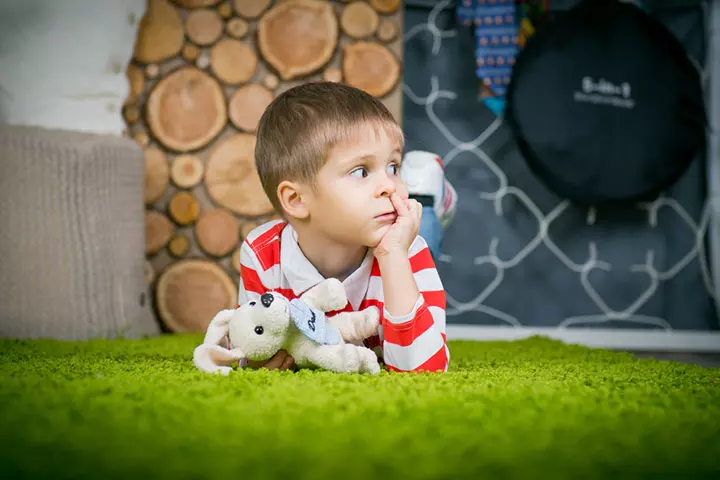
One of the common habits in children of all age groups is nose-picking. Children may develop the habit due to mucusiA sticky fluid lining the lungs, throat, nose, and mouth and produced by the tissues in the body build-up or due to boredom.
Besides the social stigma associated with nose-picking, the habit might also result in nose bleeds or introduce bacteria and viruses into the nose.
How to prevent nose-picking?
- For older children, gently tell them that nose-picking does not look good in public. Encourage them to use a tissue.
- Each time you see them pick their nose, ask them to go wash their hands. This inconvenience of washing hands will be a deterrent.
- For younger children, put on mittens or hand gloves to prevent them from picking their noses.
- Cut their nails to prevent bleeding and infection inside the nose.
- If you find their nose dry, apply saline dropsiNasal drops containing sodium chloride used to treat dry noses by adding moisture , humidifieriA device used to prevent the dryness of the air , or nasal gel in the nose to keep it moist.
- Try to keep them busy doing arts and crafts using their hands.
 Point to consider
Point to consider5. Hair-twirling
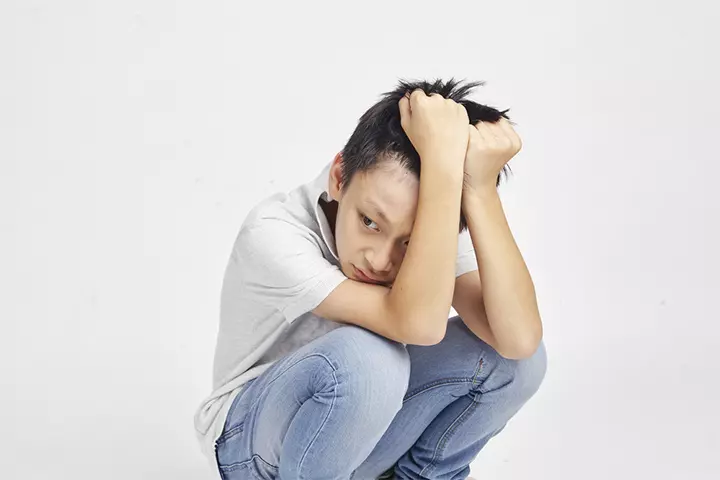
Although not very common, hair twirling is another habit children have as a result of stress or boredom. Try to notice it right before their bedtime as it’s the time for them to wind up.
It is one of the self-soothing activities commonly seen in toddlers around the age of three. In general, it would naturally subside by the age of four (1).
However, if your toddler exhibits other signs along with hair pulling or twirling, such as not talking and getting lost in their thoughts while pulling their hair, it might be a cause of concern.
How to prevent hair-twirling?
- If your child has long hair, it could make the habit even worse. Thus, it would be appropriate to give them a nice short haircut.
- Keep them busy in other activities that they might be interested in, such as dancing and cycling.
- Talk to them and try to convince them to stop doing it.
- If it is a result of stress, try addressing the cause of the stress first rather than the habit.
6. Teeth-grinding

According to the Nemours Foundation, two to three children out of ten have the habit of teeth-grinding or clenching of jaws (4). Medically called bruxismiA condition characterized by excessive teeth clenching, most common in children , teeth-grinding generally happens when children are in a deep sleep or under stress.
Other reasons for the habit include teething, misalignment of the upper and lower teeth, and pain. While most children outgrow the habit once they lose their baby teeth, others continue the habit into adolescence.
How to prevent teeth-grinding?
- Identify the cause before trying to stop the habit. Anything related to teething and a sore muscle is temporary.
- Stress-related bruxism can also be avoided by addressing the cause. Talk to your child about the things that are upsetting them or making them stressed, and help them find a way out.
- In some cases, a dental visit might be of help.
- If teeth-grinding occurs before sleep or during sleep, make them relax before bedtime by offering a warm bath or reading a book.
7. Excessive screen time

Children try to imitate adults, and when we use our smartphones, tablets, laptops, and other gadgets excessively, they would naturally pick the habit up.
Based on a report by Hub Entertainment Research, Americans aged 13 to 74 primarily spent their leisure time in 2020 on screen-based activities, with 38% watching TV and 15% going to the movies. However, in 2021, there has been a slight decrease in these habits. The graph below shows the time spent on screen-based leisure activities in 2021.

Screen-based leisure time in Americans during 2020-2021
Source: Americans’ Screen Time Activities Evolve Away from TV & MoviesMoreover, offering a smartphone or a tablet has become a way to calm down a fussy child, feed them, or keep them busy.
When your children spend more time before the screens, watching videos, or playing video games, it might affect their well-being.
As 90% of brain growth happens before the age of five, letting the kids explore the environment around them is extremely important (5). If they stick to screens, they would be less interested in their environment, which would interfere with their learning ability.
The American Academy of Child & Adolescent Psychiatry (AACAP) recommends that children below 18 to 24 months should be allowed screen time only when a parent or caregiver is present. For preschoolers aged two to five, it recommends screen time of just an hour per day (6).
How to prevent the habit of excessive screen time?
- Ensure your children use smart devices only for educational purposes.
- Keep them busy with other fun activities so that they do not ask for smartphones.
- Talk to them and set limits.
- Watch the content on smart devices together so that you can explain to them what they’re seeing. You can comment, ask questions, and make the sessions more engaging.
- Practice what you preach and set the right example. Limit your phone usage before your children.
In addition to the above-listed tips, you can also try the method that an anonymous mother of three used to reduce her children’s screen time. She says, “In our family, we went through a lot of screen time pain. It took years before we figured out a system that worked… I designed a safe for smartphones as a tool for parents to manage screen time. I called my invention TechDetox Box. It physically separates children from phones, removing the temptation and possibility of unauthorized use. The phones are locked up while charging in a central location. Parents are in control (i).”
8. Bad eating habits

Bad eating habits could encompass not eating proper meals, eating too many sugary foods, such as chocolates and ice creams, consuming junk food, and skipping breakfast. Consumption of unhealthy junk food regularly can lead to health complications, such as obesity, from an early age. According to a poll conducted by the C.S. Mott Children’s Hospital, 33% of parents who reported that their child consumed junk food at least twice a week had overweight children (7).
Not eating nutritious food may lead to health issues, and not correcting their poor eating habits would lead to bad food choices in later life.
How to prevent bad eating habits?
- If your kid skips a meal, try to include their favorite healthy snack or food during that time.
- Try to offer a variety of foods so that they have a choice. Include fruit, carb-based food, and protein.
- If they refuse to eat, do not force-feed. Let them be, and let their hunger take them to food.
- Keep them physically active so that they burn more calories and feel hungry.
- Schedule meals so that they will get used to their food timings.
 Quick tip
Quick tip9. Touching private parts
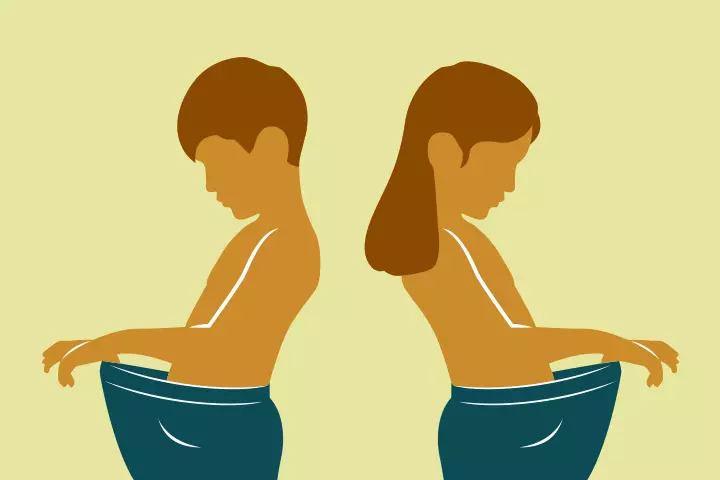
Trying to explore body parts, including private parts, by touching, rubbing, pulling, or poking, is common in young children. This behavior is seen in children of two to six years.
As they grow a little older, you might notice certain sexual behavior in them, such as looking or trying to touch someone else’s private parts, showing their private parts to others, sitting close to someone, and being curious about others’ naked bodies.
All these acts are done out of curiosity and are harmless in most cases. With some intervention, these can be corrected.
How to prevent children from touching private parts?
- Teach body parts to kids. Tell them the names of all the parts, including the genitals. Do not give any other names as it might make them believe there is something wrong with these parts.
- Also, tell them which parts are private in simple terms, such as the parts covered by a swimsuit.
- Explain to them that it’s not okay to look at or touch someone else’s body parts, and let others do the same to you.
- For younger children, make sure you dress them appropriately to avoid contact with their private parts.
- Teach your child about good touch and bad touch.
10. Frequent lying
Whether it’s your young child telling you that they have not kicked their older brother or your older child telling something about the homework, children are likely to lie at some point or the other.
According to the Child Mind Institute, children lie for various reasons — not just to get something they wish or avoid doing something. They may be lying to try out a new behavior, gain everyone’s approval, become the center of focus, or just out of impulse (8).
If the change is sudden, you might feel concerned about the behavior. However, if you can understand the cause of the behavior, you can correct it before it escalates into poor conduct.
How to prevent your child from lying?
- If your child tells some fancy stuff just to gain attention, it’s better to ignore such conversations instead of questioning them. Once you ignore such theatrics, they will understand that you do not believe in what they are saying at that moment.
- If they lie to avoid some work, you can always make it a point that there will be consequences for such acts. However, make sure the punishments are gentle, such as doing some household chores and reducing screen time.
- If they lie because they’re afraid of something, try to remove the fear first, and then the habit will automatically subside.
11. Using bad words
Using bad words is a habit that kids typically pick up after attending school. You might be wondering where they’re learning all these words. Once they start meeting different kids and people, it’s natural that they absorb these wrong inclinations.
How to prevent your child from using bad words?
- Don’t panic the very first time you hear your child using a cuss word.
- Try to ignore it in the very first instance.
- If it happens again, stay calm and try to talk to them. Make them understand that using such words is not allowed.
12. Talking back
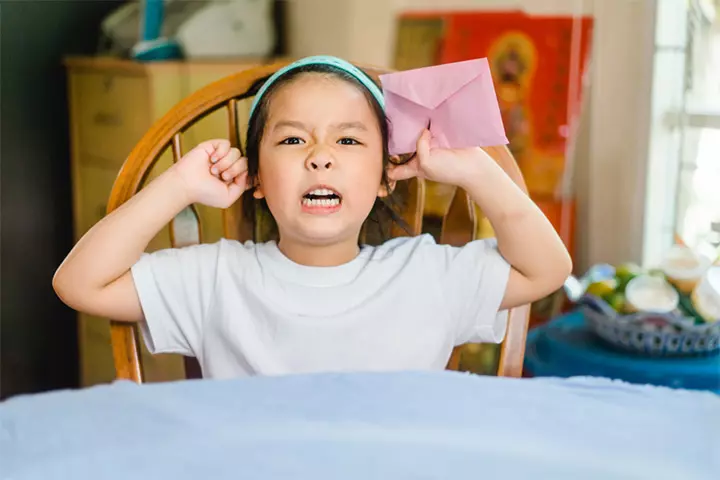
This habit is common once your child grows up and starts to gain a certain sense of independence. Once they start feeling independent, they get a feeling that they know everything, and as a result, they start responding aggressively even to simple requests. Such incorrect manners can be frustrating for parents to deal with.
Even though this behavior might drive you crazy, it’s your reaction that will decide the outcome, for better or worse.
How to prevent your child from talking back?
- Don’t raise your voice as soon as your child talks back.
- Try to stay calm and move the conversation forward in a gentle tone.
- Ask your child if everything is fine and the reason for them being irritated.
- You can also remain silent for some time until they realize their mistake.
13. Bad table manners
BurpingiA way of expelling excess air or gas in the digestive organs through the mouth , fake vomiting, speaking with food in the mouth, stabbing food, and chewing food with the mouth open are some examples of improper actions and bad table manners that children display at some point when they are growing up. If you have observed your kid indulging in such acts just because they feel it’s funny, try controlling them before the habit worsens.
How to teach your child to mind their table manners?
- Try to explain to your kids why such things are wrong and not socially acceptable.
- Ask them to follow the elders at the table.
- Teach them to respect food.
14. Uncontrolled anger
TantrumsiExpressions or emotional outbursts, most common in toddlers when their wants are not met are common in children as young as two to three years. They exhibit these undesirable tendencies when they don’t get what they want. While most children outgrow this behavior by the time they go to school, for some, it continues and leads to anger issues.
Common triggers for anger and irritability in children include not getting what they want and doing something they dislike.
How to manage uncontrolled anger in your child?
The way you respond to an angry child makes a huge difference in correcting their behavior.
- Whenever they’re angry because they didn’t get what they want, don’t give it to calm them down.
- Try to ignore the tantrum and remain silent until they realize their mistake. Don’t reply harshly or try to punish them.
- Let them know that there would be consequences for such behavior.
- Be consistent in your efforts. Once they understand that such behavior is not appropriate, they will try to change on their own.
15. Procrastination
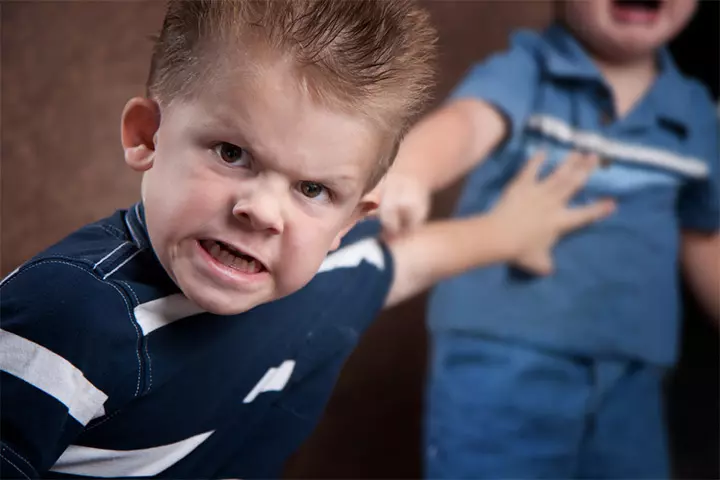
Whether it is their regular homework or some household chore they’re supposed to do, postponing things is a common habit among children. This might happen as they are not interested in the tasks or are too busy with their games and other stuff. Some kids are even too lazy to do the work on time. These harmful routines may negatively impact their academic and personal growth, leading to consequences in the future.
How to prevent procrastination?
- Tell them why postponing is not a good habit and show them examples of people in the family who do their work on time.
- If it’s because they’re not interested, try to make it enjoyable by adding some fun elements to it.
- Schedule their activities so that they don’t spend their entire time in games.
- Compliment them when they finish their tasks on time.
16. Complaining
Children sometimes complain about almost everything to avoid certain places or people. For instance, when they don’t like going to school or don’t like a fellow kid or a particular food.
How to prevent the habit of complaining?
- Be patient until your child gets accustomed to a new place or new people.
- Explain to them that it is not the right way to behave and that they should make compromises and sacrifices at times.
Ways To Discourage Bad Habits In Children
Here are some practical and easy ways to encourage good behavior and help your children stop bad habits (9) (10).
1. Gently remind and guide: Give them a kind reminder when they do a bad habit, and do not resort to scolding. This helps them change their behavior without feeling bad.
2. Set a good example: Kids learn by watching adults. If you say “Thank you” when someone helps you, your child will likely start saying it too.
3. Find fun alternatives: Provide alternative activities and give them something else to do to stop bad habits. If your child likes twirling their hair, offer them a soft ball to squeeze.
4. Give clear, positive instructions: Short and simple directions work best. Rather than saying, “Stop making a mess,” say, “Let’s put the toys back in the box.” This helps them know exactly what to do.
5. Understand why and offer solutions: Every habit has a reason. If your child hums while doing homework, they may need background noise. Try playing soft music to help them focus.
6. Work on one habit at a time: Changing too many things at once can be confusing for your child. If your child slouches and also bites their nails, help them sit up straight first. Once they get better at that, work on the next habit.
7. Praise good behavior: Compliments encourage kids to keep doing the right thing. If they wash their hands before dinner, say, “Great job keeping your hands clean!” A little praise goes a long way.
Frequently Asked Questions
1. What are the causes of bad habits in children?
Bad habits may begin as coping strategies for moments when the child feels bored, frustrated, or insecure (11). Some bad habits may begin as mimicked behavior that the child may see others doing.
2. How do bad habits affect my child’s life?
Bad habits may impact the social and personal life of a child. Issues such as anger, lying, and using inappropriate words might affect the child’s peer bonding and social life. Other habits, such as unhealthy eating, may affect their nutritional status. Habits such as procrastination and excessive screen time might affect their concentration skills, lowering their productivity.
3. What are the potential negative consequences of bad habits in children?
Bad habits in children can lead to a range of adverse outcomes. For instance, grinding teeth can lead to dental problems, while poor diets can affect a child’s overall growth, development, and health. Similarly, excessive technology use may contribute to reduced physical activity, leading to many issues, such as obesity, social skill deficits, behavioral issues, low self-esteem, and isolation (11) (12) (13).
4. What are some root causes of bad habits in children?
A child may develop bad habits due to many reasons. These causes may include boredom, stress, anxiety, peer pressure, insecurity, or low self-esteem. Sometimes, a child may also develop bad habits to seek attention or from imitating adults. Emotional trauma, unresolved emotional needs, or exposure to negative online content may also be responsible.
5. How can I determine if my child’s bad habits are due to peer pressure or something else?
Determining the root of your child’s negative behaviors can be difficult, yet there are methods to evaluate the influence of peer pressure on their behavior. Observe their conduct among peers, engage in honest conversations, and be attentive to abrupt habit shifts. Seeking professional guidance is another option that can help yield valuable perspectives and make you understand how to develop good habits in child/children.
6. What other resources are available to help parents and caregivers address bad habits in children?
Parenting books written by child psychologists, parenting experts, and educators, parenting websites and blogs, professional counseling, and offline and online parenting support groups and forums are some resources that can help parents and caregivers address bad habits in children. Irrespective of where they learn from, it is important for parents to teach their children good habits.
7. How can schools help prevent bad habits in students?
Child specialist Dr. Mubina Agboatwala suggests, “Children look up to teachers, and discussing these habits during school lessons can help kids realize the harmful effects of many of these habits. Additionally, parental support and reassurance are crucial in preventing and addressing these habits in children.”
The habits formed in the formative stages of life are likely to stay with us throughout our lives. Hence, parents must prevent and rectify bad habits in kids. Many habits, such as sucking the thumb, grinding teeth, using gadgets excessively, and twirling hair, can cause considerable damage in the long run. However, these habits can be corrected using the tips mentioned above. Understanding why children engage in such practices and keeping calm while correcting your child can help them overcome these negative habits.
Infographic: Can Anything Good Come Out Of Your Child’s Bad Habits?
Getting rid of your child’s bad habits can be a task, especially when they are not ready to listen and obey. Hence besides trying to counsel them, try something new and provide them with ideas and activities to turn those bad habits into productive actions. Use this infographic to learn about how you can do that. Illustration: Momjunction Design Team
Illustration: Bad Habits In Kids That Every Parent Should Break

Image: Stable Diffusion/MomJunction Design Team
Children may not understand the distinction between good and bad. They may develop a bad habit and may not be aware of its negative consequences. This video is about the bad habits that children should avoid.
Personal Experience: Source
MomJunction articles include first-hand experiences to provide you with better insights through real-life narratives. Here are the sources of personal accounts referenced in this article.
i. Why I lock up my kids’ devices;https://medium.com/a-parent-is-born/why-i-lock-up-my-kids-devices-c2a2989cbcfa
References
1. Your Child’s Habits; KidsHealth – The Nemours Foundation
2. Thumb-Sucking: When Should Parents Intervene?; Nationwide Children’s Hospital
3. Chapped Lips; Science Direct
4. Bruxism (Teeth Grinding or Clenching); KidsHealth – The Nemours Foundation
5. Brain Development; First Things First
6. Screen Time and Children; American Academy of Child & Adolescent Psychiatry
7. Parent Views on Fast Food and Family Meals; C.S. Mott Children’s Hospital National Poll on Children’s Health
8. Why Kids Lie and What Parents Can Do About It; Child Mind Institute
9. Encouraging positive behaviour: tips; Raising Children
10. Children’s habits; Raising Children
11. Bad Habits; Regents of the University of Michigan
12. Poor diets damaging children’s health worldwide, warns UNICEF; UNICEF
13. The Negative Effects of Technology on Children; National University
14. Association between breast-feeding practices and sucking habits: A cross-sectional study of children in their first year of life; Journal of Indian society of Pedodontics and Preventive Dentistry
15. Healthy Eating; Nemours KidsHealth
Community Experiences
Join the conversation and become a part of our nurturing community! Share your stories, experiences, and insights to connect with fellow parents.
Read full bio of Kari Rehmann
- Dr. Leah Alexander is a board-certified pediatrician who provides medical care in an outpatient setting in Fair Lawn, New Jersey. She has also been working as a pediatrician with Medical Doctors Associates at Pediatricare Associates, New Jersey, since 2005. Dr. Alexander holds a bachelor's degree in Health Science from Kalamazoo College and a Doctor of Medicine degree from Michigan State University.
 Dr. Leah Alexander is a board-certified pediatrician who provides medical care in an outpatient setting in Fair Lawn, New Jersey. She has also been working as a pediatrician with Medical Doctors Associates at Pediatricare Associates, New Jersey, since 2005. Dr. Alexander holds a bachelor's degree in Health Science from Kalamazoo College and a Doctor of Medicine degree from Michigan State University.
Dr. Leah Alexander is a board-certified pediatrician who provides medical care in an outpatient setting in Fair Lawn, New Jersey. She has also been working as a pediatrician with Medical Doctors Associates at Pediatricare Associates, New Jersey, since 2005. Dr. Alexander holds a bachelor's degree in Health Science from Kalamazoo College and a Doctor of Medicine degree from Michigan State University.
Read full bio of Sagari Gongala
Read full bio of Dr. Ritika Shah
Read full bio of Kavita Kankani






